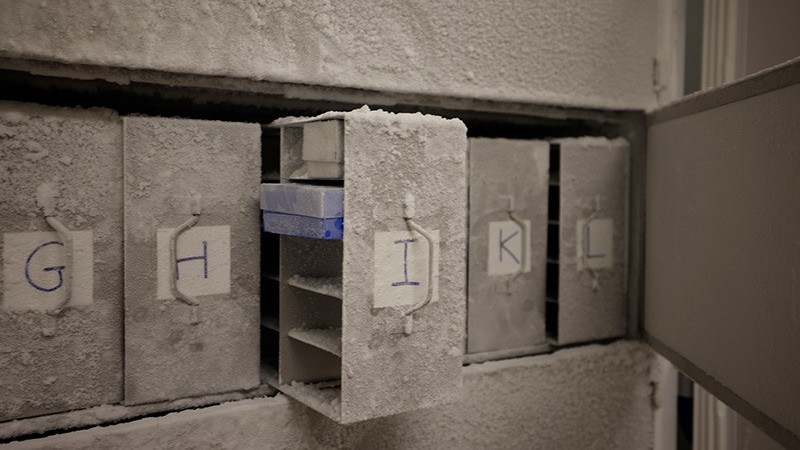'It is our obligation to future generations': Scientists want thousands of human poop samples for microbe 'doomsday vault'
The founders of the Microbiota Vault, a project that aims to preserve microbial diversity, have announced that they are ready to grow their frozen microbe collection to 10,000 samples by 2029.

Get the world’s most fascinating discoveries delivered straight to your inbox.
You are now subscribed
Your newsletter sign-up was successful
Want to add more newsletters?

Delivered Daily
Daily Newsletter
Sign up for the latest discoveries, groundbreaking research and fascinating breakthroughs that impact you and the wider world direct to your inbox.

Once a week
Life's Little Mysteries
Feed your curiosity with an exclusive mystery every week, solved with science and delivered direct to your inbox before it's seen anywhere else.

Once a week
How It Works
Sign up to our free science & technology newsletter for your weekly fix of fascinating articles, quick quizzes, amazing images, and more

Delivered daily
Space.com Newsletter
Breaking space news, the latest updates on rocket launches, skywatching events and more!

Once a month
Watch This Space
Sign up to our monthly entertainment newsletter to keep up with all our coverage of the latest sci-fi and space movies, tv shows, games and books.

Once a week
Night Sky This Week
Discover this week's must-see night sky events, moon phases, and stunning astrophotos. Sign up for our skywatching newsletter and explore the universe with us!
Join the club
Get full access to premium articles, exclusive features and a growing list of member rewards.
Scientists are deep-freezing human poop in a "doomsday" vault in Switzerland that already contains more than 1,000 fecal samples, and the researchers now say they want to amass 10,000 samples by 2029.
That's because poop contains billions of microbes that scientists want to preserve in case future generations need the bugs to solve medical and other health crises, according to a commentary published Friday (June 27) in the journal Nature Communications. The Swiss storage facility also houses almost 200 types of fermented food, which contain plenty of "gut-friendly" microbes that could help keep populations healthy, and the team plans to add environmental microbes to the collection.
The aim over the long term is to have backup copies of microbes that live in humans, animals, plants and the environment so that future generations can conduct research, restore ecosystems and invent medical treatments as needed.
"Microbe loss is associated with an alarming rise in chronic diseases, such as allergic, autoimmune and metabolic disorders," the researchers wrote in the commentary. "The loss of microbial diversity extends to environmental ecosystems, jeopardizing agricultural systems and environmental resilience."
There is a need to preserve all types of microbes, because human activities are responsible for the disruption of the microbiomes, or microbial communities, of humans, animals and the environment, the authors argue. For example, conventional agriculture, the thawing of permafrost due to human-caused climate change, and the overuse of antibiotics are eroding microbiomes so much that they might need to be rescued in the future, the team wrote.
Related: 8 ancient 'zombie viruses' that scientists have pulled from the melting permafrost
"Human activities are depleting our microbiome, and there's lots of evidence of that," Dr. Martin Blaser, director of the Center for Advanced Biotechnology and Medicine at Rutgers University in New Jersey and co-author of the new commentary, said in a statement.
Get the world’s most fascinating discoveries delivered straight to your inbox.
There is currently no proof that reintroducing frozen microbes into a human gut or ecosystem can restore it, but "we believe that one day the science will improve sufficiently so that we will have really good restorative techniques," Blaser said.
The project in Switzerland, called the Microbiota Vault, started in 2018. The researchers who founded it were inspired by the Svalbard Global Seed Vault, a "doomsday" seed depository in Norway that currently holds around 1.3 million plant samples to preserve genetic diversity as it dwindles in the real world.
Until now, the Microbiota Vault was in its "launch" phase, where it tested the feasibility of collecting and exporting poop and fermented foods from across the world, according to the commentary. Researchers in Switzerland have received a total of 1,204 fecal samples and 190 food samples from Benin, Brazil, Ethiopia, Ghana, Laos, Thailand and Switzerland over the past seven years, and these samples are currently stored at minus 112 degrees Fahrenheit (minus 80 degrees Celsius) at the University of Zurich.
The initiative is now in a "growth" phase, where researchers want to acquire thousands of additional samples, including microbes from threatened ecosystems, according to the commentary. Plans are also underway to find a permanent location for the vault, ideally in a country with a cold climate, such as Switzerland or Canada.
"Maybe 100 years from now, having saved these microbes could prevent a major disaster," Blaser said in the statement.
"It is our obligation to future generations to preserve this microbial diversity," the team added in the article.

Sascha is a U.K.-based staff writer at Live Science. She holds a bachelor’s degree in biology from the University of Southampton in England and a master’s degree in science communication from Imperial College London. Her work has appeared in The Guardian and the health website Zoe. Besides writing, she enjoys playing tennis, bread-making and browsing second-hand shops for hidden gems.
You must confirm your public display name before commenting
Please logout and then login again, you will then be prompted to enter your display name.
 Live Science Plus
Live Science Plus










